
Foreign relations of Latvia are the primary responsibility of the Ministry of Foreign Affairs. Today's Republic of Latvia regards itself as a continuation of the 1918–1940 republic. After the declaration on the restoration of its full independence on August 21, 1991, Latvia became a member of the United Nations on September 17, 1991, and is a signatory to a number of UN organizations and other international agreements. Latvia welcomes further cooperation and integration with NATO, European Union, OECD and other Western organizations. It also seeks more active participation in UN peacekeeping efforts worldwide.
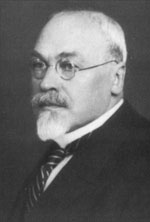
Gustavs Zemgals was a Latvian politician and the second President of Latvia. He also was twice the mayor of Riga.

The People's Council of Latvia was a temporary council which declared Latvia's independence on November 18, 1918 and then acted as the temporary parliament of the country until a Constitutional Assembly was elected.

The Bank of Latvia is the central bank of Latvia. It is among the nation's key public institutions and carries out economic functions as prescribed by law. It was established in 1922.
The aim of the Student Union of Latvia is to represent Latvia's students, and to work for the observance of their rights and interests at a national and international level.
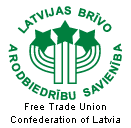
The Free Trade Union Confederation of Latvia is the only national trade union center in Latvia. It was founded in 1990 as a reformation of the Soviet era trade unions. LBAS is the biggest non-governmental organisation in Latvia which protects the interests of professional trade union members and employees on the branch and interbranch level. LBAS coordinates the cooperation between 23 independent Latvian trade unions, represents and protects the interests of its members in the national and international institutions, implements a joint working programme.
The Communist Party of Latvia was a political party in Latvia.

The Latvian National Guard or NG is a part of the Latvian National Armed Forces. The National Guard is a basic land component, consisting of volunteers who perform traditional national guard duties such as crisis response and support for military operations. It consists of the Staff Headquarters and 4 brigades, which are divided into 18 battalions. The National Guard continued its development also after Latvia joined NATO.

The World Assembly of Youth (WAY); French: Assemblée Mondiale de la Jeunesse, Spanish: Asamblea Mundial de la Juventud is the international coordinating body of national youth councils and national youth organisations. The full members of WAY are national youth councils. WAY currently has 140 member organisations from all continents. As the international coordinating body of national youth councils, WAY has special consultative status with the United Nations, the highest status possible for a non-governmental organization. WAY co-operates with the UN and many of its special agencies, particularly with UNAIDS, UNEP, ILO, UNESCO, UNFPA, UNICEF, UNDP, UNCTAD and WHO.

Māra Zālīte is a Latvian writer and cultural worker.

Latvijas Radio is Latvia's national public-service radio broadcasting network. It began broadcasting on 1 November 1925, and has its headquarters in the Latvian capital, Riga. Latvijas Radio broadcasts six different channels in the FM band as well as via the internet: Latvijas Radio 1, Latvijas Radio 2, Latvijas Radio 3 – Klasika, Latvijas Radio 4 – Doma laukums, Latvijas Radio 5 – Pieci.lv, and Latvijas Radio 6 – Radio NABA.
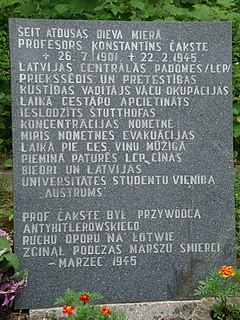
The Latvian Central Council was the pro-independence Latvian resistance movement during World War II from 1943 onwards. The LCC consisted of members from across the spectrum of former leading Latvian politicians and aimed to be the governing body of a democratic Republic of Latvia after the war. Its military units were an alternative to the Soviet partisans also operating in Latvia.
The FIMCAP, which is short for Fédération Internationale des Mouvements Catholiques d’Action Paroissiale, is an umbrella organization for Catholic youth organizations. Its 31 member organizations are based in 28 countries. The FIMCAP was founded in 1962 and is recognised as an official Catholic organization by the Dicastery for Laity, Family and Life. FIMCAP is also a full member of the European Youth Forum.

The Ministry of Economics of the Republic of Latvia is the leading state administrative institution responsible for economic policy in Latvia. The ministry also represents the economic interests of Latvia in the European Union.

Movement For! is a liberal political party in Latvia. It is positioned in the centre on the political spectrum. The party was formed in August 2017, and it is one of the members of the Development/For! alliance.
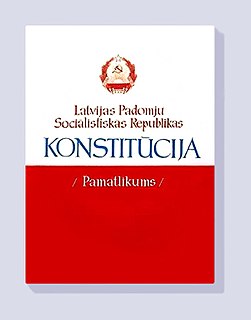
The 1978 Constitution of the Latvian SSR, officially the Constitution of the Latvian Soviet Socialist Republic was the constitution of the Latvian Soviet Socialist Republic adopted on April 18, 1978 at the eighth session of the 9th Convocation of the Supreme Soviet of the Latvian SSR.
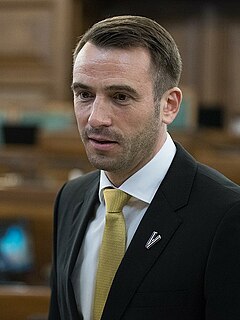
Mārtiņš Staķis is a Latvian politician and businessman, currently serving as Mayor of Riga since 2020. He served as a deputy of the 13th Saeima, the Latvian parliament, until he resigned on 5 June 2020. On 29 August 2020, Staķis was elected to the Riga City Council, and on 2 October, elected Mayor of Riga.
PROVIDUS is a non-governmental, non-partisan and non-profit think-tank, established by the Soros Foundation in 2002. Think-tank PROVIDUS is a non-governmental organisation operating in the public interest and they are officially recognized as such. PROVIDUS’ mission is to promote evidence-based policy and open society values.